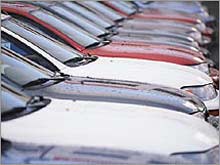Detroit's new rulesAutomakers scramble to catch up with changes in consumer behavior. Fortune's Alex Taylor reports how they're dealing with seismic shifts in the business.NEW YORK (Fortune) -- In the auto business, where new cars take 36 months or more to move from a designer's inspiration to the dealer showroom, changes can take years to reveal themselves. At least they used to. These days, seismic events seem to rock the industry on a daily basis. Take the impact of private equity. Now that Cerberus has taken over Chrysler, and financiers are sharpening their pencils for Jaguar and Land Rover, a few far-seeing analysts expect greater innovation and faster decision-making to ripple through the rest of the industry.  Equally big changes are shaping consumer behavior. Recent conversations with import automakers on the West Coast, as well as some surprising announcements by General Motors (Charts, Fortune 500), suggest that some current business practices are rapidly becoming obsolete. Here are just a few of the new rules. Long ago, Toyota brand passenger cars passed the Ford (Charts, Fortune 500) and Chevy nameplates to become the number one seller. Now Toyota is poised to become number one in car and truck sales combined. How does "baseball, hot dogs, apple pie and Toyota" roll off your tongue? What's the price of leadership? People taking potshots at your backside. As soon as Toyota rolled out customer cash and zero percent financing on its new Tundra pickup, a competitor leaked the news to journalists. Others tried a subtler approach. GM went public what it called "full-size pickup facts" that seemed carefully selected to portray its Chevy and GMC in the best light. So instead of talking about their sales this year, which have improved only modestly despite the rollout of new models, GM chose to herald big improvements from 2003 to 2007 in "Brand image" (up 17 percent) and from 2004 to 2007 in Average Transaction Price (up $2,600 per unit). That's like a baseball player ignoring his lousy batting average and bragging about his sacrifice bunts.
Marketer Jim Farley, who recently took over as head of Lexus, made his name at the Scion division by eschewing print and television advertising in favor of the Internet and other less traditional methods that he hoped would build stronger relationships with potential consumers. Now General Motors confesses that it is shifting more of its ad dollars into online advertising too. The reason, according to marketing boss Mark LaNeve, is that the Web is more effective in combating the lagging perceptions that continue to dog GM: poor fuel economy, bad quality and high prices. LaNeve likes the way that digital ads can direct consumers to thousands of pages of information about products, prices and the competition. He sees an even bigger payoff from the potential of immediacy. Since consumers turn to the Web when they are getting serious about buying a new car, advertising there allows GM to get more involved in the shopping process.
While Honda announced that it is discontinuing the gasoline-electric version of the Accord because of slow sales, the Toyota Prius continues to defy gravity. Once considered a novelty, the Prius is selling more strongly now than at any time in its seven-year history. Its volume is running at twice the rate of a year ago and Toyota now expects that Prius will outsell every single domestic passenger car nameplate except for the Chevy Impala. Why the diverging fortunes? Honda was selling added performance in the Accord hybrid, which didn't resonate with consumers the way that better fuel economy does. Besides, the hybrid Accord looked like every other Accord, meaning consumers couldn't get credit for being "green" when they parked it in front of their homes. The Prius, by comparison, can't be confused with anything else.
Those with long memories can remember Dinah Shore pitching Chevrolets in the 50s and Ricardo Montalban rhapsodizing about Corinthian leather in the Chrysler Cordoba of the 1970s. Now GM has decided that Tiger Woods, one of the world's best known athletes - and best paid endorsers - is getting in the way of Buick sales. GM is nudging Woods away from pitching Buicks and getting him to appear in ads for OnStar, its telematic service, instead. LaNeve says the presence of Woods "detracts from the product message." He adds: "We don't want a celebrity at the core of any brand." He didn't mention whether he blames Woods for the fact that that sales of Buick cars are down 21 percent this year. I guess that means Paris Hilton won't be inking a deal to endorse Hummers anytime soon. |
|
